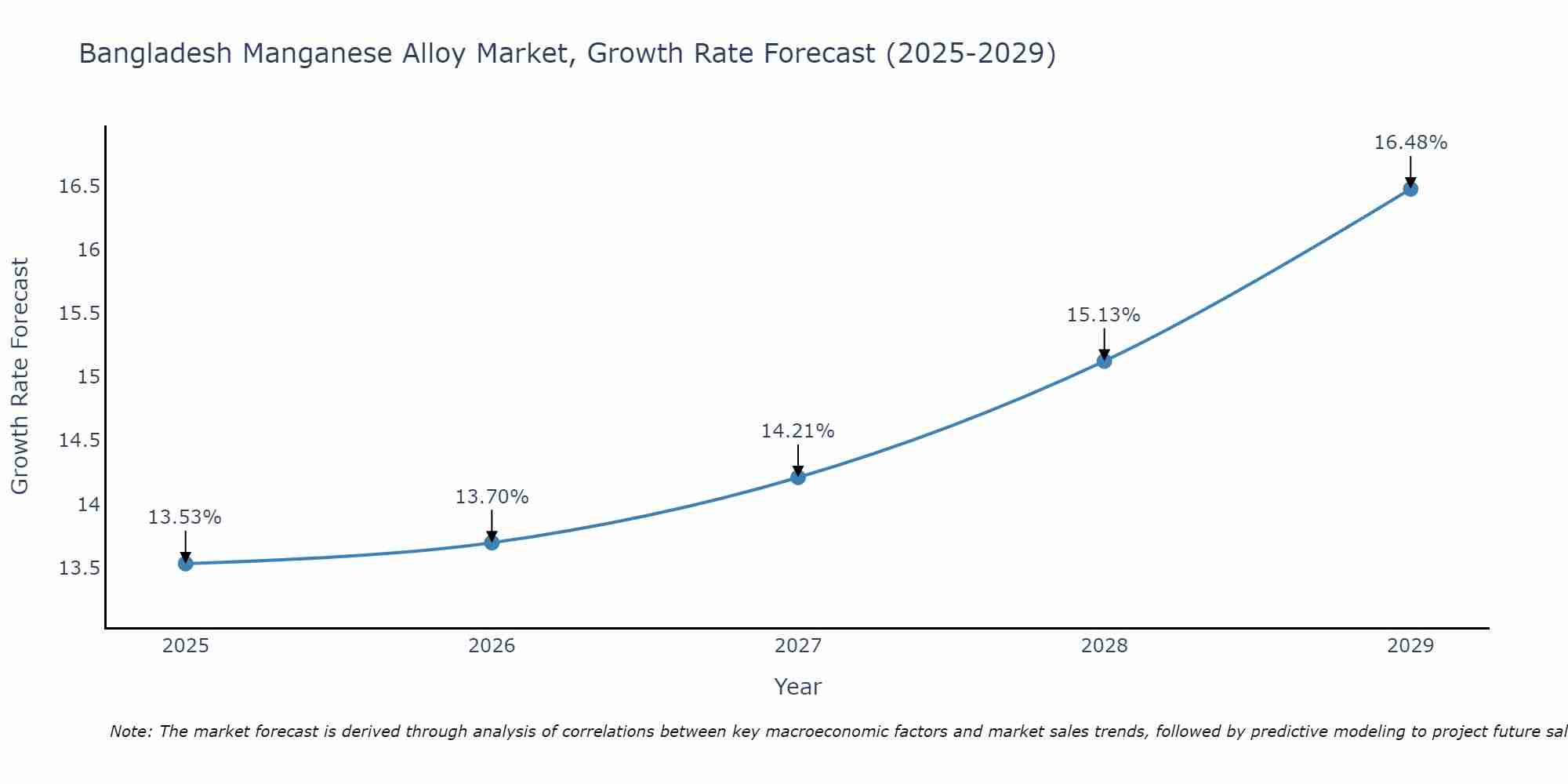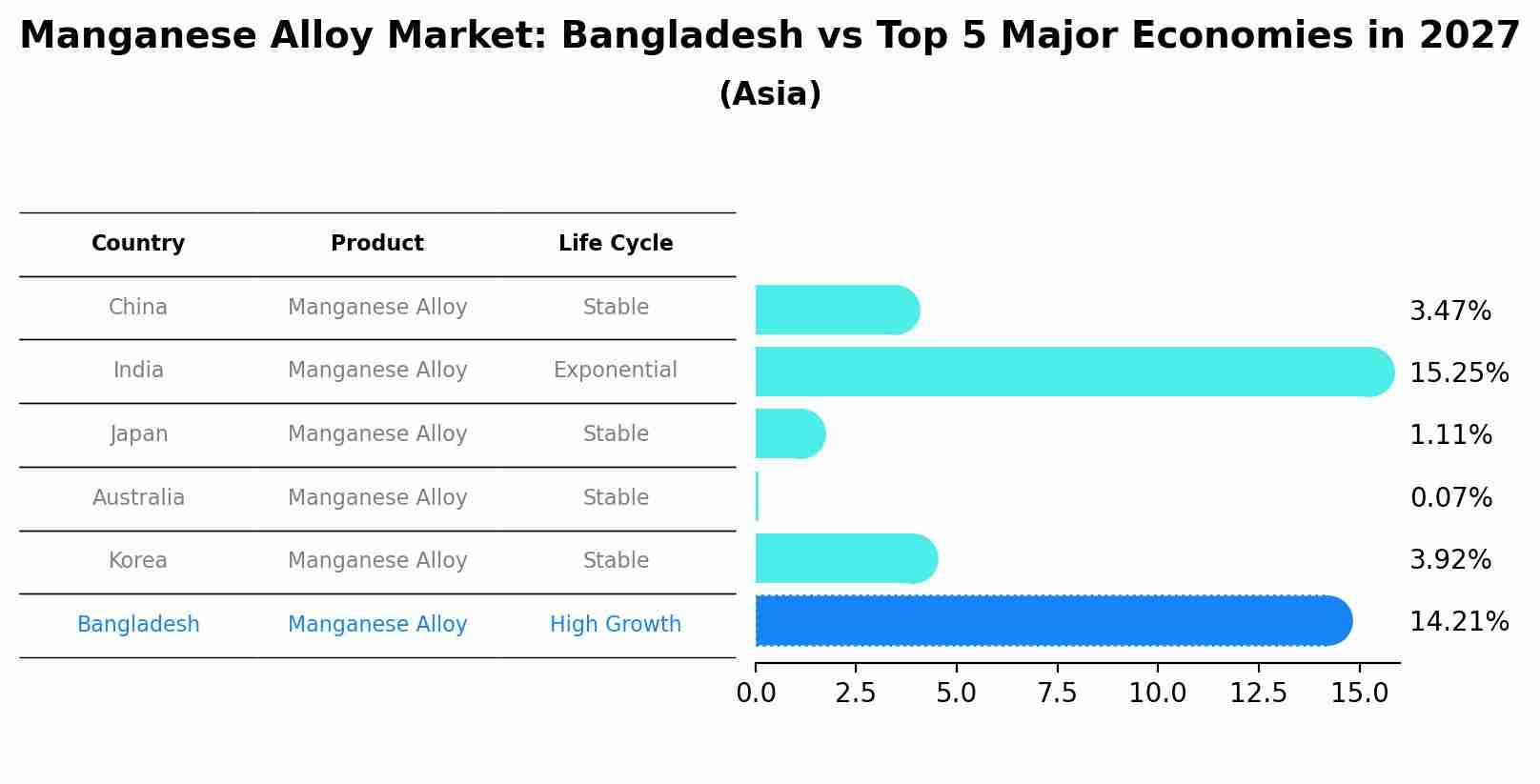Bangladesh Manganese Alloy Market (2025-2031) Outlook | Share, Industry, Companies, Revenue, Trends, Growth, Size, Forecast, Value & Analysis
| Product Code: ETC091851 | Publication Date: Jun 2021 | Updated Date: Jun 2025 | Product Type: Report | |
| Publisher: 6Wresearch | Author: Dhaval Chaurasia | No. of Pages: 70 | No. of Figures: 35 | No. of Tables: 5 |
Bangladesh Manganese Alloy Market Size Growth Rate
The Bangladesh Manganese Alloy Market is poised for steady growth rate improvements from 2025 to 2029. From 13.53% in 2025, the growth rate steadily ascends to 16.48% in 2029.

Manganese Alloy Market: Bangladesh vs Top 5 Major Economies in 2027 (Asia)
The Manganese Alloy market in Bangladesh is projected to grow at a high growth rate of 14.21% by 2027, highlighting the country's increasing focus on advanced technologies within the Asia region, where China holds the dominant position, followed closely by India, Japan, Australia and South Korea, shaping overall regional demand.

Bangladesh Manganese Alloy Market Overview
The Bangladesh manganese alloy market is characterized by steady growth driven by the country`s increasing demand for steel production. Manganese alloys are essential in the steelmaking process as they improve the strength, toughness, and wear resistance of steel. The market is primarily dominated by ferromanganese and silicomanganese products, with key players including BSRM, PHP Group, and Kabir Steel Group. The industry is influenced by factors such as raw material availability, government regulations, and global market trends. The demand for manganese alloys in Bangladesh is expected to continue rising due to infrastructure development projects, construction activities, and the expansion of the automotive sector. As the country aims to strengthen its industrial base, the manganese alloy market presents opportunities for further growth and investment.
Bangladesh Manganese Alloy Market Trends
The Bangladesh Manganese Alloy Market is experiencing steady growth due to the increasing demand from the steel industry for enhancing the properties of steel. The market is witnessing a shift towards the production of high-grade manganese alloys with lower carbon content to meet the stringent quality standards of end-users. Additionally, there is a rising focus on sustainable practices and energy-efficient production methods in the manganese alloy sector to reduce environmental impact. Market players are also exploring technological advancements to improve the efficiency of manganese alloy production processes. Overall, the Bangladesh Manganese Alloy Market is expected to continue its growth trajectory driven by the expanding steel industry and the increasing emphasis on quality and sustainability.
Bangladesh Manganese Alloy Market Challenges
In the Bangladesh Manganese Alloy Market, challenges include fluctuations in global manganese ore prices, leading to uncertainty and volatility in production costs for local manufacturers. Additionally, inadequate infrastructure and logistical issues can hinder the smooth transportation of raw materials and finished products, impacting operational efficiency. Regulatory complexities and compliance requirements also pose challenges for market players, potentially increasing administrative burdens and costs. Furthermore, competition from foreign suppliers and fluctuations in demand from key industries such as steel production can create market instability and pricing pressures. Overall, navigating these challenges requires strategic planning, effective risk management, and continuous adaptation to the dynamic market conditions in the Bangladesh Manganese Alloy sector.
Bangladesh Manganese Alloy Market Investment Opportunities
The Bangladesh Manganese Alloy Market offers promising investment opportunities due to the country`s growing steel industry and increasing demand for manganese alloys in the construction and infrastructure sectors. Investing in manganese alloy production companies or establishing a manganese alloy manufacturing plant in Bangladesh could be lucrative. With the government`s focus on industrial development and infrastructure projects, there is a rising need for high-quality manganese alloys to improve the strength and durability of steel products. Additionally, the presence of abundant manganese ore reserves in Bangladesh provides a competitive advantage for investors looking to capitalize on the country`s potential as a key player in the global manganese alloy market. However, thorough market research and understanding of regulatory frameworks are essential before making any investment decisions in this sector.
Bangladesh Manganese Alloy Market Government Policy
The Bangladesh government has implemented various policies to regulate the manganese alloy market in the country. One significant policy is the imposition of a 5% import duty on raw materials used in manganese alloy production to incentivize domestic production. Additionally, the government has set quality standards and specifications for manganese alloy products to ensure they meet international standards and enhance competitiveness in the global market. Furthermore, there are regulations in place to monitor and control environmental pollution caused by manganese alloy production processes, promoting sustainable practices in the industry. Overall, these policies aim to support the growth of the Bangladesh manganese alloy market by fostering domestic production, ensuring product quality, and promoting environmental sustainability.
Bangladesh Manganese Alloy Market Future Outlook
The future outlook for the Bangladesh Manganese Alloy Market appears promising due to the country`s growing steel industry and infrastructure development projects. With increasing demand for steel products in construction, automotive, and manufacturing sectors, the need for manganese alloys as an essential component for steel production is expected to rise. Moreover, the government`s focus on industrial growth and initiatives to attract foreign investments will likely drive the market further. However, challenges such as fluctuating raw material prices and global economic conditions could impact the market`s growth. Overall, the Bangladesh Manganese Alloy Market is projected to witness steady growth in the coming years, supported by the expanding steel sector and favorable government policies.
Key Highlights of the Report:
- Bangladesh Manganese Alloy Market Outlook
- Market Size of Bangladesh Manganese Alloy Market, 2021
- Forecast of Bangladesh Manganese Alloy Market, 2031
- Historical Data and Forecast of Bangladesh Manganese Alloy Revenues & Volume for the Period 2021 - 2031
- Bangladesh Manganese Alloy Market Trend Evolution
- Bangladesh Manganese Alloy Market Drivers and Challenges
- Bangladesh Manganese Alloy Price Trends
- Bangladesh Manganese Alloy Porter's Five Forces
- Bangladesh Manganese Alloy Industry Life Cycle
- Historical Data and Forecast of Bangladesh Manganese Alloy Market Revenues & Volume By Type for the Period 2021 - 2031
- Historical Data and Forecast of Bangladesh Manganese Alloy Market Revenues & Volume By Ferro-Manganese for the Period 2021 - 2031
- Historical Data and Forecast of Bangladesh Manganese Alloy Market Revenues & Volume By Metallic Manganese for the Period 2021 - 2031
- Historical Data and Forecast of Bangladesh Manganese Alloy Market Revenues & Volume By Nickel-Manganese Alloy for the Period 2021 - 2031
- Historical Data and Forecast of Bangladesh Manganese Alloy Market Revenues & Volume By Nitrided Manganese Alloy for the Period 2021 - 2031
- Historical Data and Forecast of Bangladesh Manganese Alloy Market Revenues & Volume By Silico-Manganese for the Period 2021 - 2031
- Historical Data and Forecast of Bangladesh Manganese Alloy Market Revenues & Volume By Iron-Manganese Alloys for the Period 2021 - 2031
- Historical Data and Forecast of Bangladesh Manganese Alloy Market Revenues & Volume By Application for the Period 2021 - 2031
- Historical Data and Forecast of Bangladesh Manganese Alloy Market Revenues & Volume By Foundry for the Period 2021 - 2031
- Historical Data and Forecast of Bangladesh Manganese Alloy Market Revenues & Volume By Steel for the Period 2021 - 2031
- Historical Data and Forecast of Bangladesh Manganese Alloy Market Revenues & Volume By Superalloys for the Period 2021 - 2031
- Historical Data and Forecast of Bangladesh Manganese Alloy Market Revenues & Volume By Welding Electrodes for the Period 2021 - 2031
- Historical Data and Forecast of Bangladesh Manganese Alloy Market Revenues & Volume By End-users for the Period 2021 - 2031
- Historical Data and Forecast of Bangladesh Manganese Alloy Market Revenues & Volume By Medical for the Period 2021 - 2031
- Historical Data and Forecast of Bangladesh Manganese Alloy Market Revenues & Volume By Mining Industry for the Period 2021 - 2031
- Historical Data and Forecast of Bangladesh Manganese Alloy Market Revenues & Volume By Chemical Industry for the Period 2021 - 2031
- Historical Data and Forecast of Bangladesh Manganese Alloy Market Revenues & Volume By Machinery Manufacturing Industry for the Period 2021 - 2031
- Bangladesh Manganese Alloy Import Export Trade Statistics
- Market Opportunity Assessment By Type
- Market Opportunity Assessment By Application
- Market Opportunity Assessment By End-users
- Bangladesh Manganese Alloy Top Companies Market Share
- Bangladesh Manganese Alloy Competitive Benchmarking By Technical and Operational Parameters
- Bangladesh Manganese Alloy Company Profiles
- Bangladesh Manganese Alloy Key Strategic Recommendations
Frequently Asked Questions About the Market Study (FAQs):
- Single User License$ 1,995
- Department License$ 2,400
- Site License$ 3,120
- Global License$ 3,795
Search
Related Reports
- Australia IT Asset Disposal Market (2025-2031) | Strategy, Consumer Insights, Analysis, Investment Trends, Opportunities, Growth, Size, Share, Industry, Revenue, Segments, Value, Segmentation, Supply, Forecast, Restraints, Outlook, Competition, Drivers, Trends, Demand, Pricing Analysis, Competitive, Strategic Insights, Companies, Challenges
- UAE Building Thermal Insulation Market Outlook (2025-2031) | Revenue, Companies, Share, Trends, Growth, Size, Forecast, Industry, Analysis & Value
- Portugal Electronic Document Management Market (2025-2031) | Strategy, Consumer Insights, Analysis, Investment Trends, Opportunities, Growth, Size, Share, Industry, Revenue, Segments, Value, Segmentation, Supply, Forecast, Restraints, Outlook, Competition, Drivers, Trends, Demand, Pricing Analysis, Competitive, Strategic Insights, Companies, Challenges
- France Electronic Document Management Market (2025-2031) | Strategy, Consumer Insights, Analysis, Investment Trends, Opportunities, Growth, Size, Share, Industry, Revenue, Segments, Value, Segmentation, Supply, Forecast, Restraints, Outlook, Competition, Drivers, Trends, Demand, Pricing Analysis, Competitive, Strategic Insights, Companies, Challenges
- Portugal Occupational Health & Safety Services Market (2025-2031) | Strategy, Consumer Insights, Analysis, Investment Trends, Opportunities, Growth, Size, Share, Industry, Revenue, Segments, Value, Segmentation, Supply, Forecast, Restraints, Outlook, Competition, Drivers, Trends, Demand, Pricing Analysis, Competitive, Strategic Insights, Companies, Challenges
- Netherlands Occupational Health and Safety Services Market (2025-2031) | Strategy, Consumer Insights, Analysis, Investment Trends, Opportunities, Growth, Size, Share, Industry, Revenue, Segments, Value, Segmentation, Supply, Forecast, Restraints, Outlook, Competition, Drivers, Trends, Demand, Pricing Analysis, Competitive, Strategic Insights, Companies, Challenges
- Belgium and Luxembourg Facility Management Market (2025-2031) | Strategy, Consumer Insights, Analysis, Investment Trends, Opportunities, Growth, Size, Share, Industry, Revenue, Segments, Value, Segmentation, Supply, Forecast, Restraints, Outlook, Competition, Drivers, Trends, Demand, Pricing Analysis, Competitive, Strategic Insights, Companies, Challenges
- Russia Women Intimate Apparel Market (2025-2031) | Strategy, Consumer Insights, Analysis, Investment Trends, Opportunities, Growth, Size, Share, Industry, Revenue, Segments, Value, Segmentation, Supply, Forecast, Restraints, Outlook, Competition, Drivers, Trends, Demand, Pricing Analysis, Competitive, Strategic Insights, Companies, Challenges
- Africa Chocolate Market (2025-2031) | Size, Share, Trends, Growth, Revenue, Analysis, Forecast, industry & Outlook
- Global Hydroxychloroquine And Chloroquine Market (2025-2031) | Industry, Trends, Size, Outlook, Growth, Value, Companies, Revenue, Analysis, Share, Forecast
Industry Events and Analyst Meet
Our Clients
Whitepaper
- Middle East & Africa Commercial Security Market Click here to view more.
- Middle East & Africa Fire Safety Systems & Equipment Market Click here to view more.
- GCC Drone Market Click here to view more.
- Middle East Lighting Fixture Market Click here to view more.
- GCC Physical & Perimeter Security Market Click here to view more.
6WResearch In News
- Doha a strategic location for EV manufacturing hub: IPA Qatar
- Demand for luxury TVs surging in the GCC, says Samsung
- Empowering Growth: The Thriving Journey of Bangladesh’s Cable Industry
- Demand for luxury TVs surging in the GCC, says Samsung
- Video call with a traditional healer? Once unthinkable, it’s now common in South Africa
- Intelligent Buildings To Smooth GCC’s Path To Net Zero













